Health Innovation East is hosting the East of England Stroke Forum until July 2025 to help connect healthcare professionals from across our region.
The first annual East of England Stroke Conference, held on 19 September 2023, was joined by over 200 attendees, with more than 25 speakers with vast experience within stroke care.
To open the day, we were fortunate to have Deb Lowe, Rebecca Fisher, and a virtual David Hargroves to cover the National Stroke Programme with Juliet Bouviere closing out the day with a presentation on the Patient-Reported Experience Measures. Other topics from the day included, improving stroke therapy SSNAP scores, screening for atrial fibrillation and developing a secondary prevention protocol for our patients. A full programme from the day can be found here.
Recordings of each presentation and entries from the poster competition can be found below. These resources are designed for health care professionals.
Our sponsors 2023
The East of England Stroke Forum Conference 2023 was sponsored by Daiichi-Sankyo* and Irwin Mitchell.
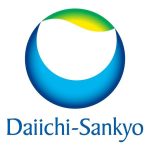

* The meeting was organised by Health Innovation East and sponsored through funding by Daiichi Sankyo. Daiichi-Sankyo has had no involvement in the organisation of the meeting.
East of England Stroke Forum Conference 2023
Presentation recordings:
Plenary and patient story
Plenary and patient story
Speakers:
Sara Betsworth
Co-chair, East of England Stroke Forum Steering Group
Service delivery lead, Stroke Association
Sandra Ross
Suffered a stroke in September 2017, employed by the charity Different Strokes
View the slides here
National Stroke Programme
National Stroke Programme
Speakers:
Dr David Hargroves
Consultant physician, East Kent Hospitals University Trust
National specialist adviser, NHS
GIRFT national clinical lead for stroke
Dr Deb Lowe
Consultant stroke physician and geriatrician, Wirral University Teaching Hospital NHS Foundation Trust
NHS national clinical director for stroke
Dr Rebecca Fisher
Principal research fellow, University of Nottingham
View Deb Lowe and Rebecca Fisher’s slides here
View David Hargroves’ slides here
Improving stroke therapy SSNAP scores: moving on up
Improving stroke therapy SSNAP scores: moving on up
Speaker:
Julia Sartorius
Lead Physiotherapist for Stroke, Lister Hospital.
Session synopsis:
We will outline the challenges that our busy, acute service has faced over the last few years – namely the pandemic, staffing shortages and recruitment problems.
This has inevitably impacted our SSNAP scores and explains the context behind our project.
Our quality improvement project is focused on our occupational therapy and physiotherapy services, with a goal to improve therapy SSNAP scores in domains 5,6 and 8. We will present our project and discuss early successes, but also highlight the barriers we have faced and our learning in relation to
this. We will finish by sharing our future ambitions and consider our progress in the context of the new stroke guidelines.
Learning outcomes:
- Share our 7-step model for quality improvement and the benefits we have experienced from working closely with our QI team (SSEF E20)
- Share our methods for improving intensity and responsiveness of occupational therapy and physiotherapy on ASU and HASU (SSEF E10)
- Highlight the impact that ‘on the ground’ clinicians can make in implementing change under challenging circumstances and the importance of maintaining hope and resilience (SSEF E18)
View the slides here
Our experience of using Pharyngeal Electrical Stimulation
(PES) to help re-establish safe swallowing
Our experience of using Pharyngeal Electrical Stimulation
(PES) to help re-establish safe swallowing
Speaker:
Rebecca Oxtoby
Highly specialist SLT
UK therapy development manager, Phagenesis
Miriam Mitchell
Service lead-adult acute speech & language therapy, Mid and South Essex NHS Foundation Trust
Session synopsis:
An overview of our experience of using Pharynx – PES to help restore safe swallowing/improve secretion management in some patients post-stroke.
Learning outcomes:
- To understand what is PES and what does it target
- To identify suitable patients
- To discuss with group our experience of starting using this type of treatment, the drawbacks, and positives of our experience
View the slides here
Accuracy of stroke and TIA diagnosis by acute stroke nurses
Accuracy of stroke and TIA diagnosis by acute stroke nurses
Speaker:
Catherine Go
Acute Stroke Nurse Specialist, Colchester Hospital
Rebecca Smith
Advanced stroke nurse practitioner
Session synopsis:
Accurate evaluation of patients presenting with acute stroke syndromes can be challenging in a sea of stoke mimics.
Acute stroke nurses play a vital role in early identification of stroke and TIA in the frontline, however literature on their diagnostic accuracy is scarce. ASNs’ diagnostic accuracy of stroke and TIA in this audit was acceptable with room for improvement.
Majority of missed strokes were found to be posterior strokes. Improvement plan includes ongoing breach reviews and feedback for reflective learning, as well as additional teaching sessions.
Learning outcomes:
- Gain awareness on the role and accuracy of ASNs in the diagnosis of Stroke and TIA
- Gain insight into reasons for misdiagnosis and common pitfall
- Gain insight into the quality improvement plan implemented to improve assessment skills
and clinical judgment of ASNs’
View the slides here
Quality improvement initiative: early mobilisation post stroke
Quality improvement initiative: early mobilisation post stroke
Speaker:
Lisa Marshall
Specialist physiotherapist, stroke unit, Colchester Hospital
Session synopsis:
To review early mobilisation post stroke with reference to the evidence base, our quality improvement project and current research.
Learning outcomes:
- To have an understanding of the need for early mobilisation post stroke (SSEF E9 E10)
- To have knowledge of the theory and evidence base of early mobilisation and how research outcomes change practice (SSEF E20)
- To have an awareness of current therapy led research activity – AVERT dose (SSEF E20)
View the slides here
Multidisciplinary mortality review
Screening for atrial fibrillation: the SAFER trial
Multidisciplinary mortality review
Screening for atrial fibrillation: the SAFER trial
Speaker:
Dr Ramachandran Sivakumar
Consultant stroke physician and lead, Colchester General Hospital
Session synopsis:
This session will highlight the themes around stroke mortality and areas to focus to reduce mortality. The presenter will also share their experience of implementing multidisciplinary stroke specific mortality review.
Learning outcomes:
- Structured stroke specific mortality review improves process and staff knowledge (E9, 11, 18, 19)
- Focus on preventing deterioration is more useful
- Empowerment of MDT staff is essential and effective
- It is vital that staff are educated about decision-making process regarding palliative care decisions
Speaker:
Dr Rakesh Modi
Academic GP partner
Senior clinical research associate, Primary Care Unit, University of Cambridge
Clinical lead for research, Cambridgeshire and Peterborough ICB (South)
Chair, Inequalities Research Network
Session synopsis:
Dr Modi will discuss AF, screening and the SAFER trial, the delivery of screening programmes, and what this means for other screening programmes.
Learning outcomes:
- The significance of atrial fibrillation with regards to stroke
- The debate about screening for AF and screening in general
- The importance of using evidence to deliver and implement programmes
- The shortfalls in current AF care and how we can improve this for better stroke reduction
View the ‘multidisciplinary mortality review’ slides here
View the ‘screening for atrial fibrillation: the SAFER trial’ slides here
Improve the early identification and referral to specialist services of problematic tone and spasticity for patients following acute stroke
Developing a secondary prevention protocol for our patients
Improve the early identification and referral to specialist services of problematic tone and spasticity for patients following acute stroke
Developing a secondary prevention protocol for our patients
Speaker:
Samuel Hodgson
Clinical lead physiotherapist, Neurosciences service, Norfolk and Norwich University Hospital
Session synopsis:
This presentation will aim to evaluate the strategies used to implement a process for early identification of problematic tone and spasticity within an acute stroke service. The outcomes of the improvement project will be summarised as well as some of the barriers and suggestions for adaption and long-term implementation.
Learning outcomes:
- To review the evidence base and importance of early assessment and identification of tone and spasticity.
- To analyse a framework for early identification of tone and spasticity that could be adapted and transferred to individual services.
- Gain a greater understanding into the faciliatory leadership skills needed as part of quality improvement methodology.
Speaker:
Alison Whear
Advanced clinical practitioner, Hertfordshire Community NHS Trust
Session synopsis:
I completed a Quality Improvement Project for my final year MSc Advanced Clinical Practice. This QI project developed a time efficient way to build in more secondary stroke education to patients during their rehabilitation stay. It was found many patients arrived at the unit with no knowledge of what may
have caused their stroke, why they were taking new medication and lifestyle risk factors of a secondary stroke and steps to improve these.
Through using the PDSA cycle method of quality improvement I was able to establish versatile methods for the unit to ensure all staff were involved in improving a patients stroke knowledge.
This has resulted in our patients and their carers/families being discharged back to the community with a clear understanding of the causes of their stroke and preventative measures to take to reduce their risk of a secondary stroke. They have an awareness of the six-month review process so they can begin to prepare for identifying their unmet needs and ensure they use the six-month review process to the maximum.
Learning objectives:
- To ensure secondary stroke prevention and health education is a vital part of rehabilitation pathway for patients. To ensure patients have the answers to the questions about their stroke and individual risk factors.
- To share the principles of quality improvement to ensure this is a regular part of practice for all professionals. To encourage education pathways to be developed so all staff, patients and carers become stroke champions.
- To link with community pathways and service providers to enable the six-month review process to have a greater impact by starting the assessment with patients throughout their post-stroke journey. This should patients and their carers to become knowledgeable and informed of their unmet needs and the six-month review process to build on resolving these unmet needs rather than purely identifying.
View the ‘service improvement project’ slides here
View the ‘developing a secondary prevention protocol for our patients’ slides here
A service evaluation to support implementation of the Integrated Community Stroke Service using telerehabiliation in community stroke rehabilitation: a progress report
A service evaluation to support implementation of the Integrated Community Stroke Service using telerehabiliation in community stroke rehabilitation: a progress report
Speaker:
Dr Nicola Hancock
Associate pro-vice-chancellor for innovation, University of East Anglia
Session Synopsis:
This session will provide a rationale for exploring telerehabiliation as a service delivery model with the ICSS, and the service evaluation tools used to ensure breadth and depth of information is gained to underpin further decisions. It will then provide a progress report on a funded service evaluation in East of England community stroke services.
Learning outcomes:
- To understand the evolution of remote working in community stroke services via the existing evidence base
- To understand a mixed- methods service evaluation model in community stroke practice
- To gain insight into current use of telerehabiliation/remote working in East of England community stroke services.
View the slides here
The power of connectivity
The power of connectivity
Speakers:
Louise Hornagold
Engagement lead, Stroke Association
Sara Betsworth
Co-chair, East of England Stroke Forum Steering Group
Service delivery lead, Stroke Association
Session synopsis:
- Why connectivity is important (to information, expertise, and peers with experience)
- Examples of connectivity through patient stories – Stroke Recovery Service and Stroke Association Connect
- Reflecting on our individual agency in connecting
Learning outcomes:
- An opportunity to reflect on why connectivity is critical and the role we all have to play
- Understand more about the patient centred approach to Life After Stroke Services and remote support options
- Identify a follow action to increase your connectivity
View the slides here
Patient story and closing comments
Patient story and closing comments
Speaker:
Julie Lesslie
Stroke survivor
Session synopsis:
A brief story of my stroke, how I was treated and my recovery up to the present day.
Poster competition entries:
Winning entry: “Driving After Stroke – A service evaluation to inform a new pathway”. The winning entry shares their work with driving assessment centres to provide ‘fitness to drive’ assessments for stroke survivors.
Driving after stroke – a service evaluation to inform a new pathway
Driving after stroke – a service evaluation to inform a new pathway
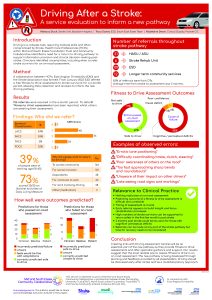
View and download the poster here
Implementation of an upper limb pathway to increase activity of the upper limb across two acute stroke recovery units
Implementation of an upper limb pathway to increase activity of the upper limb across two acute stroke recovery units

View and download the poster here
The ‘Art of Conversation’
The ‘Art of Conversation’
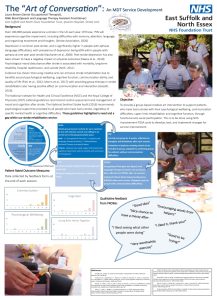
View and download the poster here
Making every moment count – a service improvement project to increase patient and family-led purposeful activity on a stroke rehabilitation ward
Making every moment count – a service improvement project to increase patient and family-led purposeful activity on a stroke rehabilitation ward
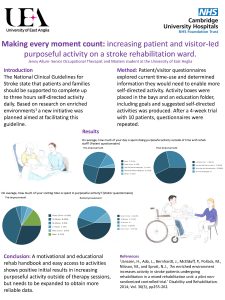
View and download the poster here
Implementing physiotherapy exercise groups in a large acute neurosciences unit
Implementing physiotherapy exercise groups in a large acute neurosciences unit
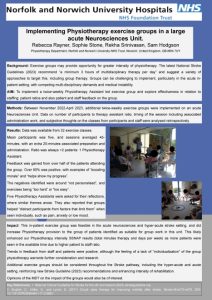
View and download the poster here
How acceptable are Aphasia iCafe interview student-led online social support groups
How acceptable are Aphasia iCafe interview student-led online social support groups
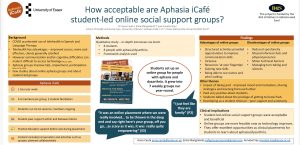
View and download the poster here
Cardia myxoma associated stroke – case presentation of elderly women with cardiac myxoma and stroke, best management literature review
Cardia myxoma associated stroke – case presentation of elderly women with cardiac myxoma and stroke, best management literature review
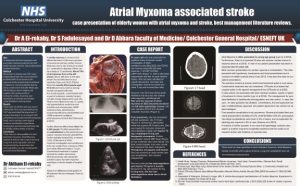
View and download the poster here
An exploration of physiotherapy students’ experiences of of using mirror therapy for neurological patients in a placement setting
An exploration of physiotherapy students’ experiences of of using mirror therapy for neurological patients in a placement setting
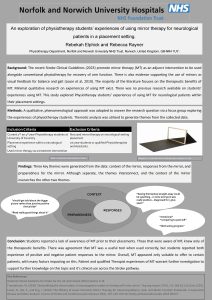
View and download the poster here
A co-created and personalised digital support package for stroke survivors and their families – ‘My Stroke Companion’
A co-created and personalised digital support package for stroke survivors and their families – ‘My Stroke Companion’
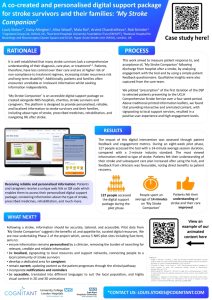
View and download the poster here
Get involved
To be kept up-to date on the interactive learning sessions, the regional conferences or to request access to the online repository, please register your interest below. If you would like to hear more about this project, or would like to get involved, please contact strokeforum@healthinnovationeast.co.uk.
You can also find out about our wider work in improving the detection and management of cardiovascular disease (CVD).